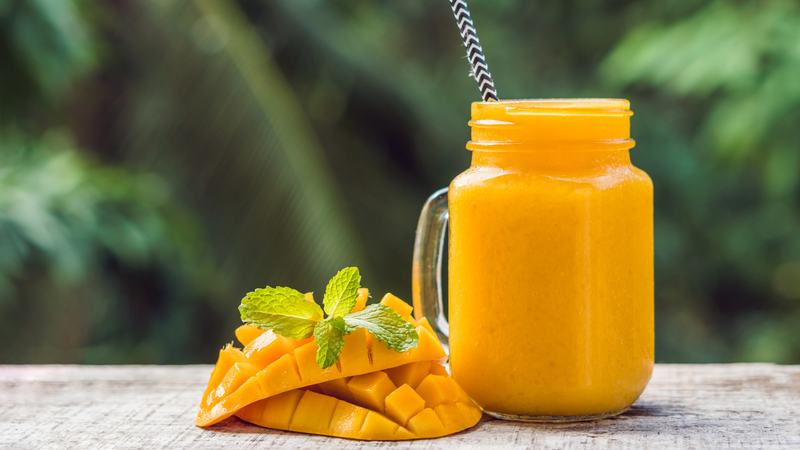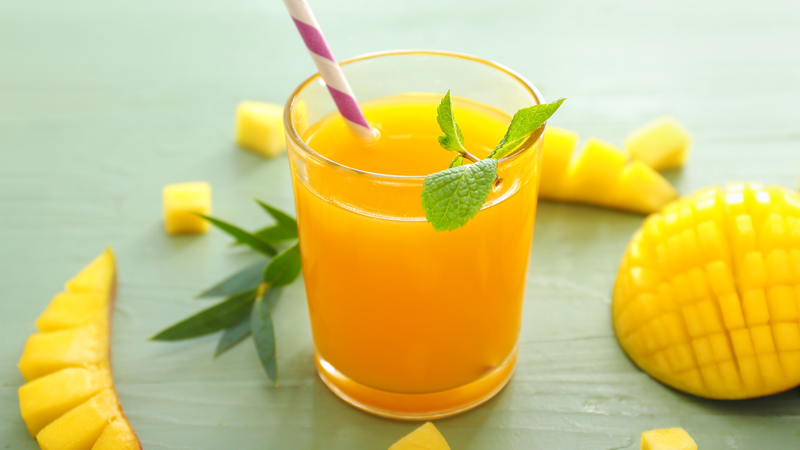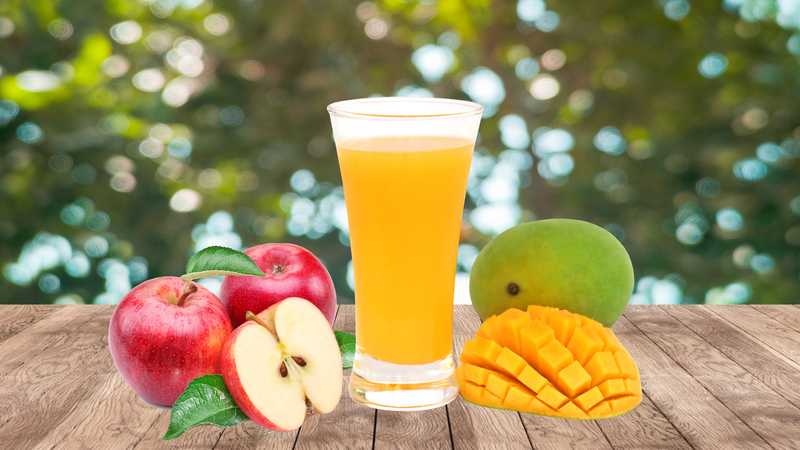Mango juice is a delicious and easy-to-make drink that is a rich source of vitamins and minerals, which helps aid digestion, improve eyesight and boost the immune system. This article will help you explore in detail the nutritional value of mangoes and the benefits that mango juice brings to the body.
Mangoes are not only famous for their sweet taste and characteristic aroma, but also contain many nutrients that are beneficial to health. This fruit is rich in vitamins and minerals, and also contains many powerful antioxidants. To better understand, this article will provide detailed information about the nutritional composition of mangoes, as well as the benefits of mango juice.
Nutritional value of mangoes
Mangoes are a nutritious fruit, providing many essential nutrients for the body. In every 100g of mango, there are about 60 kcal. This amount of calories is enough to provide energy without worrying about gaining weight, because mangoes contain very little fat, cholesterol and saturated sodium.
One of the highlights of mangoes is that it provides 1.6g of fiber per 100g. Fiber not only helps support digestion but also helps reduce cholesterol, stabilize blood sugar and maintain cardiovascular health.
In addition, mangoes also contain many important vitamins such as:
- Vitamin B5 (pantothenic acid): This vitamin participates in the process of energy production and helps reduce stress.
- Vitamin A: Plays an important role in maintaining vision, protecting the eyes from macular degeneration and cataracts.
- Vitamin C: Mangoes are a rich source of vitamin C, which helps strengthen the immune system, fight free radicals and prevent aging.
Mangoes are also rich in minerals such as potassium, magnesium and copper, which play an important role in maintaining electrolyte balance, supporting the nervous system and bone health.
In addition, mangoes also contain many antioxidant compounds such as quercetin, beta-carotene and astragalin. These substances have the ability to fight damage caused by free radicals, helping to protect cells from oxidation and prevent chronic diseases:
- Quercetin: A flavonoid with anti-inflammatory effects, reducing the risk of cardiovascular disease and cancer.
Beta-carotene: Converted to vitamin A in the body, beta-carotene helps improve vision and supports skin health. - Astragalin: Another flavonoid that has anti-inflammatory properties, protects cells from oxidative stress, and prevents degenerative diseases.

Mango is a nutritious fruit, providing many vitamins and minerals.
Benefits of Mango Juice
Mango juice is not only delicious but also has many health benefits. Here are some specific benefits of mango juice:
Reduces blood pressure
Mango juice contains a significant amount of potassium, an important mineral that helps regulate blood pressure. Potassium acts as a vasodilator, helping to widen blood vessels and improve blood circulation. This helps reduce pressure on the cardiovascular system, thereby reducing the risk of heart disease, stroke and high blood pressure.
Improves vision
Thanks to its high content of carotenoids and vitamin A, mango juice has the ability to improve vision. Vitamin A helps protect the retina from oxidative stress and reduces the risk of eye-related diseases such as macular degeneration and cataracts.
Reduces bad cholesterol
Vitamin C in mango juice not only helps boost the immune system but also reduces bad cholesterol (LDL). This helps prevent plaque buildup in the arteries, reducing the risk of heart disease and stroke.
Good for the digestive system
Mango juice has long been known to stimulate digestion and relieve constipation. With its natural fiber content and mild laxative properties, mango juice helps lubricate the digestive tract, reducing bloating, cramps and abdominal pain.

Mango juice is rich in fiber, good for digestion and reduces constipation.
Good for Diabetes
Although mangoes contain natural sugars, when consumed in moderation, mango juice can help regulate blood sugar levels. In particular, for people with diabetes, consuming a small amount of mango juice can prevent sudden increases and decreases in glucose.
Strengthens the immune system
A glass of mango juice provides 60 – 80% of the daily vitamin C requirement, which helps increase the production of white blood cells, improving immunity. This not only helps protect the body from infections but also reduces the risk of chronic diseases.
Improves blood circulation
Mango juice contains a sufficient amount of iron to promote the production of red blood cells. This helps prevent symptoms of anemia such as fatigue, cognitive disorders and health-related problems.
Best Time to Drink Mango Juice
The best time to enjoy a glass of mango juice is in the morning or mid-morning. Drinking mango juice in the morning helps the body to kick-start metabolism, provide natural energy and maintain water balance throughout the day.
However, it should be noted that drinking mango juice in the evening or before going to bed can cause discomfort or affect sleep due to the natural sugar content in mango.
How to make delicious, cooling mango juice
Mango juice is not only simple and easy to make, but also a great cooling drink on hot days. Here are some ways to make mango juice combined with many different fruits.
Pure ripe mango juice
Ingredients:
- Ripe mango;
- Sugar (or salt optional);
- Ice.
How to make:
- Cut the mango into small pieces, remove the seeds.
- Marinate the mango with sugar for 10 minutes.
- Squeeze the marinated mango to get the juice.
- Pour the juice into a glass, add sugar or salt to taste, stir well and add ice to enjoy.

Pure ripe mango juice helps you enjoy the full delicious taste
Green Mango Juice
Ingredients:
- Green mango;
- Lemon juice and a little sugar.
How to make:
- Wash the green mango, remove the skin and seeds.
- Slice into small pieces and squeeze the juice.
- Add lemon juice and sugar to enhance the flavor.
Mango Pineapple Juice
Ingredients:
- 2 mangoes;
- 1 pineapple;
- 1 piece of ginger;
- ½ lemon.
How to make:
- Peel the mango and pineapple, squeeze the juice.
- Add ginger juice and lemon to enhance the flavor.
- Stir well, add ice and enjoy.
Mango Guava Juice
Ingredients:
- 1 mango;
- 1 guava;
- ½ lemon.
How to make:
- Wash the mango and guava, cut into pieces.
- Squeeze the mango and guava to extract the juice.
- Add lemon juice, sugar and stir well.
Mango Apple Juice
Ingredients:
- 1 mango;
- 1 apple;
- ½ lemon.
How to make:
- Wash the mango and apple, cut into pieces.
- Squeeze the mango and apple to get the juice.
- Add lemon juice and stir well before enjoying.

The combination of mango and apple creates a refreshing juice.
Mango Banana Juice
Ingredients:
- 1 mango;
- 1 banana;
- ½ lemon.
How to make:
- Peel the mango, peel the banana, squeeze the juice.
- Add lemon juice and stir well.
Carrot Mango Juice
Ingredients:
- 1 mango;
- 2 carrots;
- ½ lemon.
How to make:
- Squeeze the mango and carrot to get the juice.
- Add lemon juice to the glass and stir well.
Notes when drinking mango juice
Although mango juice is very good for your health, you should also note the following to ensure safe use:
- Do not drink too much: Mangoes contain a lot of natural sugar, so excessive consumption can cause weight gain or increase blood sugar levels.
- People with allergies: Some people may be allergic to the latex from mangoes, especially the peel. Therefore, if you have signs of allergy when eating mango, you should avoid using juice from this fruit.
Mango juice is a nutritious drink, rich in vitamins and minerals necessary for the body. However, to take full advantage of its benefits, it must be drunk properly, at the right time and not overused.





